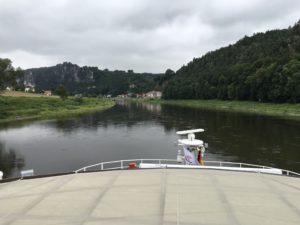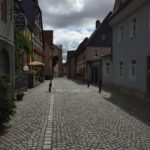
The Elbe River has its origin in the Krkonoše Mountains on the northwest border of the Czech Republic and ends in the North Sea.
It’s the Elbe that will carry us to our prized destinations of Torgau and Wittenberg over the next few days.
Extending their hegemony to the Elbe was a goal of the Romans, who suffered perhaps their greatest defeat at the Battle of the Teutoburg Forest, where they were defeated by an alliance of Germanic tribes in 9 A.D., forever limiting the reach of the Roman Empire to the Rhine River. It explains why we have not seen any Roman ruins in Prague or the Czech Republic.
The Elbe was also the eastern border of the Carolingian Empire during the reign of Charlemagne in the ninth century. This fact has special relevance to us because Charlemagne is a GSB Kingdom Hero.
Our day began in Decin, from which we departed at 6:15 a.m. We arrived in Bad Schandau around 9:00 a.m. Bad Schandau is a town filled with brothels and casinos, and is run by former agents of the East German Stasi who have banded together to form a German mafia of sorts that extorts money from local businesses, hence the name “Bad” Schandau.
Ok, actually that is not true. “Bad” in German means “Spa” and is a designation given to certain resort towns in Germany.

Bad Schandau is most famous for having been the site for the filming of Quentin Tarrintino’s movie, Inglorious Basterds, a fact that has no special relevance to the GSB or the Reformation.
It rained most of the day, which we might have disdained, but the rain also made possible our stops in Torgau and Wittenberg, so we have not complained, and we were able to enjoy the sights along the Elbe from the ship’s top deck during a break in the rain and in the lounge when it began raining again.
Cruising provides an interesting perspective. For millennia people have lived and built their cities on the banks of rivers. Often this has been purely practical. More commonly today river banks have become prime real estate because of the view. Cruising reverses that perspective, allowing one to step out of the world into a quiet place from which to observe, interested but detached.
We finished in Dresden, a city the Allies bombed into oblivion toward the end of World War II. The decision to bomb was controversial and has been second-guessed ever since. The bombing killed nearly 25,000 people and raises the ethical question of whether civilians are legitimate targets in war. I’ve addressed a related issue with regard to other abuses during war (Why Our Troops Shouldn’t Urinate on the Enemy). Kingdom citizens must be ready to provide ethical guidance in such situations because Kingdom citizens are to be the light of the world, not lackeys for humanistic politicians and military tacticians.
It was German night on the ship, and we were treated to traditional German food and music. We ate dinner again with our new friends, a Chinese couple from Los Angeles we met the first night on the ship. They came to the United States thirty years ago to go to college. After giving birth to their first child, they were befriended by someone who invited them to a church, where they both met Jesus and were baptized. Not being familiar with European history they have expressed dismay at how cultures that could build the majestic cathedrals one sees in Europe could so completely abandon the religion that inspired their construction. It’s a fair question and one to be addressed later in the week.
Tomorrow: Dresden. GSB
